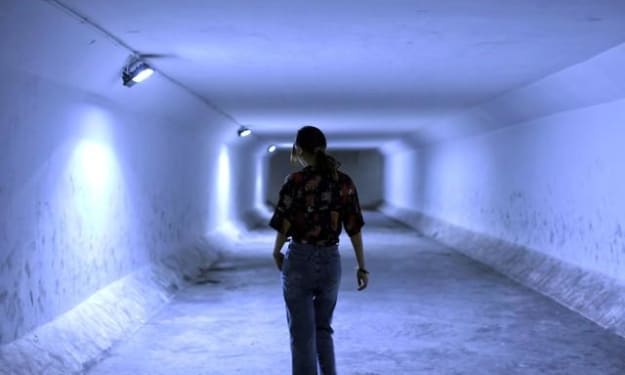PMDD & Coping with Isolation
When the Coping Tool is Also the Thing With Which We Must Cope

I recently polled my Facebook followers asking them what they turn to first when the PMDD rage hits. The results showed that most women choose to isolate. Since we feel we can't control our responses, perhaps that is indeed the best way to avoid trouble.
So, we cope with our symptoms via isolation. But how then, do we cope with the isolation? What a strange and wild loneliness women with PMDD must feel! Having just suffered a rather powerful bout of hair-triggered rage myself, I too chose to withdraw and cocoon myself. It's not necessarily something I chose because I wanted to, but it felt necessary because I knew that the slightest thing could set me off. To avoid the humilitation of that, and to protect loved ones, it seemed the best option.
We don't want to hurt those we love, get fired from our jobs, insult perfect strangers, or have public meltdowns. So what choice do we have? Removing ourselves from any interaction seems to make perfect sense. But is it healthy?
While I think it is definitely healthier for those around us than making them the receivers of our blowouts, I can't help but feel that maybe it isn't the best thing in the world for the one isolating. There's nothing wrong with "alone-time", but this is different. We already feel fragile, out of control, and possibly even frightened of ourselves. Yet we must cope with all that alone.
Maybe that's why PMDD support groups and alliances with other women with the disorder are so important. Of course, even those can be challenging. We can just as easily turn on one another without meaning to, without wanting to. But at least we have a deeper empathy for each other when we do...at least, I hope we do.
I was curious to find out what the psychology community had to say about dealing with isolation and loneliness. But most of what I found seemed to assume that isolation wasn't a necessity, but a temporary state easily alleviated with a little bit of effort. Nothing came from the angle of what to do about needing to be isolated or how to deal with inescapable isolation.
We cope with isolation, but we also need to cope with isolation. It's an irony. So what can we do?
We Can Learn to Enjoy Our Own Company.
Instead of looking at our isolation as a sentence or punishment, look at it as a retreat...a time to be with yourself, to rediscover your priorities and values, and a time to refocus. If the antidote to loneliness is connecting to others, than we need to use our time to reconnect to ourselves.
We Can Make the Most of Our Time.
A little busy-ness can help alleviate the discomfort. Clean out a closet. Sew those buttons back on. Delete old emails. Paint, pound clay, journal...create something. Go hiking. If the energy is there, use it. Isolation doesn't have to mean we have to stop enjoying life.
We Can Keep Communicating.
Okay, so you can't go out with friends or stand cuddling your partner at the moment. That doesn't mean you can't let them know what's going on and why. Text. Email. Just let them know how you're feeling, why, and what you might need from them. Not everyone might be a safe share, but keep the lines of communcation open with those who are.
We Can Make Sure It Doesn't Become Our Status Quo
Here's the danger. We may isolate out of need, and then slowly, over time, we just get used to the isolation and stop relating. It's like we forget how. Or maybe we're just afraid to. Maybe our friends or family members drop away one by one and it's just easier to let it happen. Maybe we think this is the best that a life with PMDD has to offer. That's not true. When the symptoms abate, it's important to make all the more effort be present again.
Hiding away, even if it can offer some relief, sucks if it isn't something you genuinely want to do. It can bring with it all kinds of complex emotions such as loneliness or shame that can add to the challenges we're already facing with our symptoms. If we aren't careful, we can lose our sense of belonging in the world. Such feelings are hard to bear, let alone bring into the light of day and talk about.
If this sounds familiar, know you're not alone. Try to make the best of it and reach out for help if the sadness or despair becomes overwhelming. The IAPMD offers peer support and other resources to help you feel encouraged.
*****
Have you enjoyed what you just read? Be sure to check out my other articles on Premenstrual Dysphoric Disorder. You can also like and follow PMDD Life Support on Facebook. Your kind tips help me to continue building this library of PMDD-specific content.
About the Creator
Cheeky Minx
Cheekyminx writes intimately about PMDD (Premenstrual Dysphoric Disorder) and hosts the Facebook page PMDD Life Support, a place where women with PMDD can find information and inspiration to cope. Your contributions are appreciated!






Comments
There are no comments for this story
Be the first to respond and start the conversation.